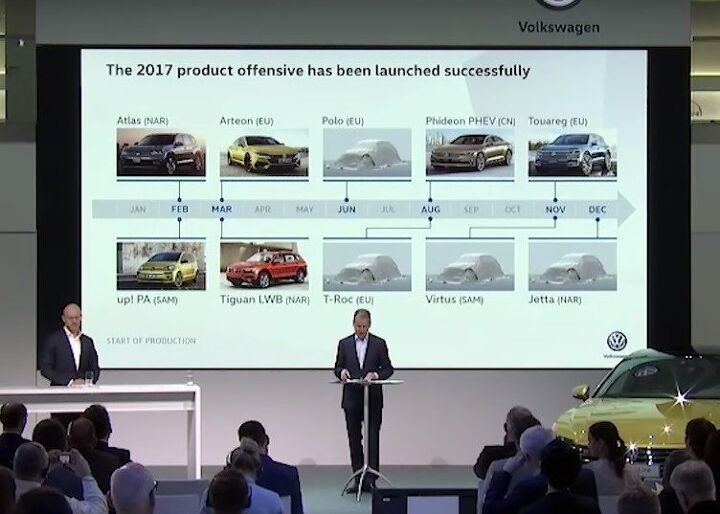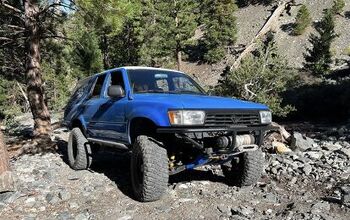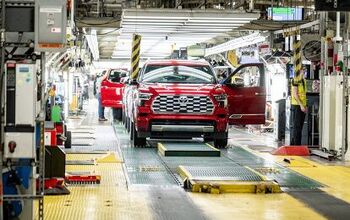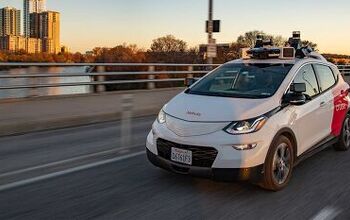Next-Generation Jetta to Launch in December: Volkswagen CEO

Lost amid the automaker’s newfound focus on bringing as many utility vehicles to global customers as possible, Volkswagen’s stalwart Jetta soldiers on without a diesel option, wearing more or less the same duds it donned for 2011. A mild — some would say unnoticeable — refresh came in 2016, but the Jetta’s U.S. sales have continued to slide at a remarkably steady rate ever since the current generation’s debut.
Naturally, Volkswagen wants to arrest the plunge. As part of its newly crafted product strategy, the automaker plans to find time for a new Jetta among all the crossovers.
In an annual meeting held May 5, Volkswagen brand CEO Herbert Diess outlined the company’s 2017 product schedule. Already the three-row Atlas is rolling off its Chattanooga assembly line, while the 2018 Tiguan (known as the Tiguan Allspace overseas) began production in March. The 2018 Jetta is listed for a December launch.
The next-generation Jetta promises a top-down revamp, with the compact moving to the company’s MQB modular architecture and adopting a more contemporary design. Engine offerings aren’t known, but the automaker has said it plans to cull a number of ICEs in the near future. Expect the 1.4-liter four-cylinder to remain as the Jetta’s frugal base powerplant. Industry journal Automotive News claims the 1.8-liter turbocharged four will likely disappear from the lineup.
While we haven’t seen spy shots or renderings of the next Jetta, seven months isn’t a long time in the life of a product. We should know more details by this summer.
Two products expected to bow in overseas markets this year will likely find their way across the Atlantic next year. VW hasn’t confirmed an arrival date for the T-Roc compact crossover or the larger next-generation Touraeg, though the U.S. remains a top market for the brand’s utility push. The luxurious CC replacement, the Arteon, will also arrive next year.
[Image: Volkswagen/ YouTube]

More by Steph Willems
Latest Car Reviews
Read moreLatest Product Reviews
Read moreRecent Comments
- Jeff Self driving cars are not ready for prime time.
- Lichtronamo Watch as the non-us based automakers shift more production to Mexico in the future.
- 28-Cars-Later " Electrek recently dug around in Tesla’s online parts catalog and found that the windshield costs a whopping $1,900 to replace.To be fair, that’s around what a Mercedes S-Class or Rivian windshield costs, but the Tesla’s glass is unique because of its shape. It’s also worth noting that most insurance plans have glass replacement options that can make the repair a low- or zero-cost issue. "Now I understand why my insurance is so high despite no claims for years and about 7,500 annual miles between three cars.
- AMcA My theory is that that when the Big 3 gave away the store to the UAW in the last contract, there was a side deal in which the UAW promised to go after the non-organized transplant plants. Even the UAW understands that if the wage differential gets too high it's gonna kill the golden goose.
- MKizzy Why else does range matter? Because in the EV advocate's dream scenario of a post-ICE future, the average multi-car household will find itself with more EVs in their garages and driveways than places to plug them in or the capacity to charge then all at once without significant electrical upgrades. Unless each vehicle has enough range to allow for multiple days without plugging in, fighting over charging access in multi-EV households will be right up there with finances for causes of domestic strife.


































Comments
Join the conversation
The 1.4 is OK, but the 1.8 is godly. It's the difference between mashed potatoes out of a box vs mashed potatoes from scratch, with butter and milk and sour cream. Hopefully the next Jetta injects some excitement back into VW's design; they're going a little too gung ho with the staid straight lines.
We bought a 2016 SEL with the 1.8 turbo. Discounts were big and the interior quality is much improved in this version. The biggest plus was the 1.8 engine though - it revs nicely and pulls strongly with good low end power. It also doesn't run out of breath at the upper end, compared to the 1.4. More recent Jettas really are vastly improved over the ones at the start of this model run. We didn't like the go cart styling of competing models and really preferred the handling and drive solidity of the current car. Combine that with some of the best outward views and you actually have a pretty competitive car. I think VW still deals with diesel scandal blow back, but I think folks overlook other models that are both fuel efficient and get the job done.